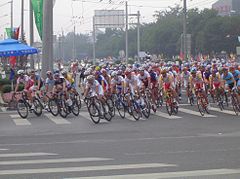Cycling at the 2008 Summer Olympics – Men's road race
| Men's cycling road race at the Games of the XXIX Olympiad
|
|||||||||||||
|---|---|---|---|---|---|---|---|---|---|---|---|---|---|

The field shortly after the start.
|
|||||||||||||
| Venue |
Urban Road Cycling Course 245.4 km (152.5 mi) |
||||||||||||
| Date | August 9 | ||||||||||||
| Competitors | 143 from 55 nations | ||||||||||||
| Winning time | 6:23:49 38.36 km/h (23.84 mph) |
||||||||||||
| Medalists | |||||||||||||
|
|||||||||||||
|
|
Samuel Sánchez |
|
|
|---|---|---|---|
|
|
Fabian Cancellara |
|
|
|
|
Alexandr Kolobnev |
|
The men's road race, a part of the cycling events at the 2008 Summer Olympics, took place on August 9 at the Urban Road Cycling Course in Beijing. It started at 11:00 China Standard Time (UTC+8), and was scheduled to last until 17:30 later that day. The 245.4-kilometre (152.5 mi) course ran north across the heart of the Beijing metropolitan area, passing such landmarks as the Temple of Heaven, the Great Hall of the People, Tiananmen Square and the Beijing National Stadium. After rolling over relatively flat terrain for 78.8 km (49.0 mi) north of the Beijing city center, the route entered a decisive circuit encompassing seven loops on a 23.8 km (14.8 mi) section up and down the Badaling Pass, including ramps as steep as a 10 percent gradient.
The race was won by the Spanish rider Samuel Sánchez in 6 hours, 23 minutes, 49 seconds, after a six-man breakaway group contested a sprint finish. Davide Rebellin of Italy and Fabian Cancellara of Switzerland, finishing second and third place with the same time as Sánchez, received silver and bronze medals respectively for the event. The hot and humid conditions were in sharp contrast to the heavy rain weathered in the women's road race the following day.
The event was one of the earliest to be concluded at the 2008 Summer Olympics, taking place on the first day of competition. Concerns were raised before the Olympics about the threat of pollution in endurance sports, but no major problems were apparent in the race.
In April 2009, it was announced that Rebellin had tested positive for Continuous erythropoietin receptor activator (CERA, a third-generation form of erythropoietin) during the Olympics. After his B-sample subsequently confirmed initial results, he returned his medal and repaid the prize money he had won from the Italian National Olympic Committee (CONI) while still maintaining his innocence. Cancellara and original fourth-place finisher Alexandr Kolobnev were later awarded new medals corresponding to their updated finishing positions.
...
Wikipedia
